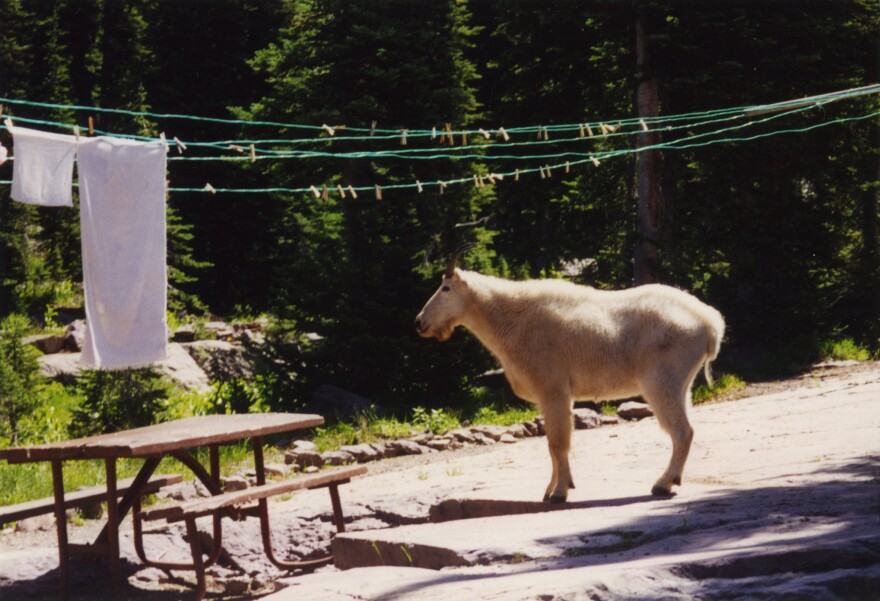The Sprague Fire that's burning in Glacier National Park reached the historic Sperry Chalet hotel building and "rapidly engulfed" it, according to the website for this historic building.
"We are saddened to inform you that Sperry Chalet has been lost," the website now reads.
Sperry Chalet.
I hadn't thought about it for years.
Back in 2000, my family spent the night, and all the memories – the miserable ones and the fantastic ones – came rushing back.
The only way to get to Sperry Chalet is by trail. And getting there is not half the fun. It's a 6.7-mile hike — "strenuous and nearly entirely uphill," the Park Service warns.
In a story I wrote about the trip for U.S. News & World Report, the adjective my children picked was "sucky."
We set out at 8 a.m. – my wife and I and our two daughters, Maya, then 14, and Daniela, 11.
We climbed for hours. Big flies bombarded our calves (and I had foolishly left our insect repellent behind to lighten our backpack load). Horse poop was scattered hither and yon (horses were the only way to get supplies up to the chalet and provided an easy option for visitors who don't care for hiking). The trail was dusty, the trees were dense, and there were no views – just signs warning us to beware of bears and mountain lions.
Finally, we emerged into a clearing. The sun beat down on us. But there was no sign of our destination.
Daniela burst into tears. "There is no Sperry Chalet," she declared.
I was beginning to think she was right.
And then ...
"Then we saw it," I wrote, "a rugged, two-story stone building with a peaked roof, high on a lonely bed of rock."

It seemed we had another four hours to go. But a mere hour and we came upon stone steps — the last leg of our epic journey. A mountain goat and her frolicking kid banished Daniela's bad mood.
"At 6,500 feet above sea level, Sperry Chalet is a Shangri-La. Mountain bluebells and yellow lilies bloom all around. Silvery Lake McDonald sits far below," I wrote back then. "The air is so clean and piney that my urban nostrils went into shock. The only sounds are the rushing of waterfalls and the buzzing of horseflies."
"Who needs the Matterhorn?" a guest gushed. "This is the most beautiful place on Earth."
The chalet was constructed by the Great Northern Railway and opened in 1914. It was part of an eight-chalet network for travelers who'd come to the park by train, then go from chalet to chalet by horseback. But the chalets fell out of favor as the automobile took over America. In 2000, when we visited, the only two chalets left were Sperry, with 17 rooms for guests and a meal plan, and Granite Park, a hiker's shelter.

We stayed in the building that has fallen to the fire. Our room had stone walls, wood beams, no electricity and no running water. There was a state-of-the-art rustic bathroom just a short walk away: an outhouse with four lemon-scented composting toilets and two cold-water sinks.
But alas, no showers.
We had lemonade at the dining room when we arrived and I remember thinking it was the best lemonade I ever drank. Definitely homemade. (Later I saw the "Country Time" mix packets in the trash.)
We took a walk to a lovely pond, we had a family-style dinner in the dining room, and then retreated to our room. The kids played cards on the rickety beds. "We'd like a TV very much, but there's nothing we can do about it," Daniela offered.
My wife and I drank in the view.
As I wrote after our trip, "The stresses of the 21st century seemed 6.7 miles away, if not farther."
When I heard the news of the fire, I felt as tearful as Daniela in her moment of woe on our endless hike. Her words echoed in my mind: "There is no Sperry Chalet."
It turns out that memory is a funny thing. Even though I distinctly remember Daniela's unhappiness on the hike, when I told Daniela about the chalet's fate, she responded with a trio of sad emojis.
But I got my hopes up when I talked to Suzie Menke, an officer manager for the chalet. "There's a groundswell of energy moving toward rebuilding," she told me. I said that maybe someday I'll put up with those nasty flies so I can find another day of bliss at Sperry Chalet.
She had some encouraging words for me: "We're joking that the fire killed the flies."
Copyright 2021 NPR. To see more, visit https://www.npr.org.



